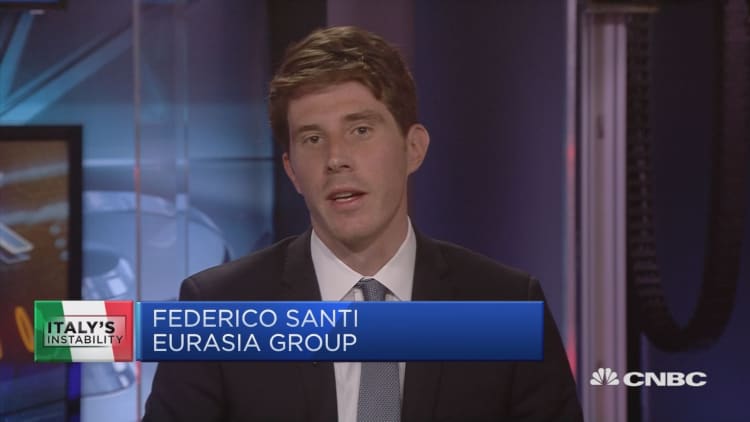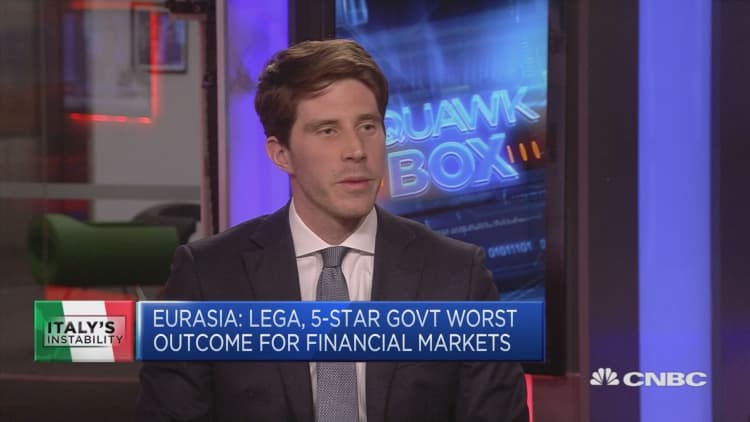
An incoming populist government in Italy may no longer be looking to ditch the euro currency, but this risk cannot be totally ruled out, one analyst told CNBC Monday.
The agreement between the right-wing Lega and the left-wing Five Star Movement (M5S) is raising concerns for market participants. This is due to higher spending plans and a potential clash with Europe over budget rules.
Another contentious point has been the idea to hold a referendum on Italy's membership of the single currency — which both parties mentioned in the run up to the March election. Though such a step does not feature in their recent coalition agreement, some analysts have not completely ruled out such a possibility.
Speaking to CNBC's "Squawk Box Europe" Monday, Federico Santi, Europe analyst at research firm Eurasia Group, said he believes that Italy has learned a lesson from Greece.
"I think they realize — at least the current leadership — that a confrontational approach to the EU and the markets is ultimately self-defeating," he said.
"I think the problem is, before we get to a point where they come to terms with the constraints that any Italian government has to face in terms of economic policy, they could cause plenty of trouble," he added, iterating that there was still a chance that a euro zone referendum could come back into play in the future.
'Empty' threats
Even if Italy were to start a process to leave the euro zone, other analysts believe the process would be stifled by different levels of bureaucracy.
Maartje Wijffelaars, a senior economist at Rabobank, said that a euro referendum would be a very lengthy process, meaning that the government would not have time to go ahead with its other policy aims. "I don't think the euro is at risk," she said via email.
She added that the two populist parties will challenge the European budget rules, but threats to leave the euro area are "empty."
"Plus, if they indeed would want to trigger a process to get Italy out of the euro, they would need to change Italy's constitution, which is a lengthy, very lengthy process — we're talking about years with almost certainly a referendum at the end of the process."
'The Italian headache'
Market players are not only worried about the stability of the euro, but also what the new Italian government could do to its economy. Some argue that concerns over fiscal slippage could cause the common currency to depreciate.
The euro has fluctuated since the start of the year — strengthening against the U.S. dollar, mainly during the first months of 2018, but then seeing a slide since late April.
Moves in the exchange rate are significant not only for currency traders, but also for equity and bond markets. This is because currency fluctuations affect the level of imports and exports — which ultimately impacts company performance — and also the level of monetary intervention from central banks.
Fiscal slippage would be a problem for Italy, given that it has the second-highest debt pile across the euro area, at about 130 percent of debt-to-gross domestic product (GDP).

"The Italian headache is going to be with us for a while, and we won't see the euro bounce meaningfully until Italian credit stabilizes," Stephen Gallo, European head of foreign exchange strategy at Bank of Montreal, told CNBC via email. He expected the euro to rise slightly in the coming months to $1.21 on the back of a lower dollar.
The euro was trading at about $1.1740 Monday morning. In February, the exchange rate hit a high of $1.2508.
Other currency analysts also believe the single currency could move higher in the coming weeks, supported by positive data releases. Viraj Patel, a foreign exchange and macro strategist at ING, said in a note Monday morning that if Italian President Sergio Mattarella postpones some of the planned spending measures, there could be a relief rally in the euro.
"We would expect a relief rally in the euro if President Mattarella pushes back on the debt-financed spending policy agenda and we get some solid euro zone data this week," he told CNBC via email.
Patel is still looking for the euro-dollar cross to be at 1.30 by year-end — but he recognized that "there is a perfect storm right now keeping the single currency depressed."


